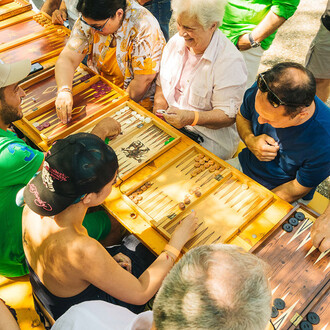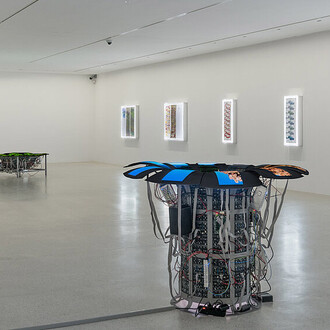Fragmentation, duplication, repetition, complementarity operate in Nil Yalter’s multi-layered textum (“web” in Latin) via a combinatory process: the artist’s oblique look crosses different media and spirals through diverse interconnected topics such as migration, labour, housing and gender providing “images”, that make the continuum of history explode.
Photographs are split in a positive/negative binomial (Chicago, 1974), inscribed in coloured drawn fans (Algerian Marriage in France, 1977), mirrored and combined together with drawings in film-like stripes (EXILE IS A HARD JOB, 2015/18). Subjects can multiply within the compositions, orbit or gradually fade: Nil Yalter uses memory as hermeneutical process of subjectivation, where singularity overlaps with multiplicity.
The artist, whose manifold practice embraces elements from social sciences and art history, commits herself to a continuous exercise of composition. Yalter intertwines the experiences of the urban pattern by merging photography with text, drawing, painting and by using different media (cardboard, textile, neon, video).
Thus, with fragments of the Jetztzeit (now-time) and the past she crafts a web, that subtends both historical temporality’s interruption and the experience of it.
In this exhibition different sources flow into a chosen reproduced textuality: French excerpts from a Le Monde’s article (23.7.1975) and some notes of the artist about the neighbourhood Bois de l'Etang (built in the late 1960s as speculative real estate operation in La Verrière, France), passages from poems by Turkish writers Hasan Hüseyin and Nâzım Hikmet, and from Friedrich Engels’ La Question du Logement (1872) are block printed on the pencil notebook-like straight lines. Nil Yalter performs the act of writing and re-writing counterbalancing the standardization of the tools (metal movable types) with the manual act of pressing, thus becoming a hybrid human-machine. The texts fill the space of geometrical concave and convex shapes, where they move and break unexpectedly against physical boundaries: the difference of their origins affirms the urgency to systematize linguistic registers that are diverse and yet united by the same unavoidable drive to denounce, to take part in a common struggle.
Nil Yalter (born 1938 in Cairo, raised in Istanbul and living in Paris since 1965) uses language as a tool to repeatedly call into question the very notion of identity: French and Turkish outline the artist’s “double-status” and are counterpoints around “EXILE IS A HARD JOB” (2015/2018) the only statement in English. The images of rituals and ritualized everyday actions are so placed in patterns that evoke the geometrical decorations characteristic of the Mediterranean basin: the figurative and abstract traditions are combined and thus purposely somewhat disregarded.
In Yalter's work through composed fragments, moved and moving perspectives, individual experiences and emotions melt into the collective ones.
And by 'emotion' we mean the human faculty to be subjugated by a feeling or a thought until it identifies itself with the object of this feeling or thought, thus coming to know it.
(Furio Jesi, Studi cosmogonici, 1958)
















